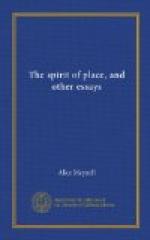Who shall say whether, by operation of the same exchange, the English poets that so persist in France may not reveal something within the English language—one would be somewhat loth to think so—reserved to the French reader peculiarly? Byron to the multitude, Edgar Poe to the select? Then would some of the mysteries of French reading of English be explained otherwise than by the plainer explanation that has hitherto satisfied our haughty curiosity. The taste for rhetoric seemed to account for Byron, and the desire of the rhetorician to claim a taste for poetry seemed to account for Poe. But, after all, patatras! Who can say?
RAIN
Not excepting the falling stars—for they are far less sudden—there is nothing in nature that so outstrips our unready eyes as the familiar rain. The rods that thinly stripe our landscape, long shafts from the clouds, if we had but agility to make the arrowy downward journey with them by the glancing of our eyes, would be infinitely separate, units, an innumerable flight of single things, and the simple movement of intricate points.
The long stroke of the raindrop, which is the drop and its path at once, being our impression of a shower, shows us how certainly our impression is the effect of the lagging, and not of the haste, of our senses. What we are apt to call our quick impression is rather our sensibly tardy, unprepared, surprised, outrun, lightly bewildered sense of things that flash and fall, wink, and are overpast and renewed, while the gentle eyes of man hesitate and mingle the beginning with the close. These inexpert eyes, delicately baffled, detain for an instant the image that puzzles them, and so dally with the bright progress of a meteor, and part slowly from the slender course of the already fallen raindrop, whose moments are not theirs. There seems to be such a difference of instants as invests all swift movement with mystery in man’s eyes, and causes the past, a moment old, to be written, vanishing, upon the skies.
The visible world is etched and engraved with the signs and records of our halting apprehension; and the pause between the distant woodman’s stroke with the axe and its sound upon our ears is repeated in the impressions of our clinging sight. The round wheel dazzles it, and the stroke of the bird’s wing shakes it off like a captivity evaded. Everywhere the natural haste is impatient of these timid senses; and their perception, outrun by the shower, shaken by the light, denied by the shadow, eluded by the distance, makes the lingering picture that is all our art. One of the most constant causes of all the mystery and beauty of that art is surely not that we see by flashes, but that nature flashes on our meditative eyes. There is no need for the impressionist to make haste, nor would haste avail him, for mobile nature doubles upon him, and plays with his delays the exquisite game of visibility.




